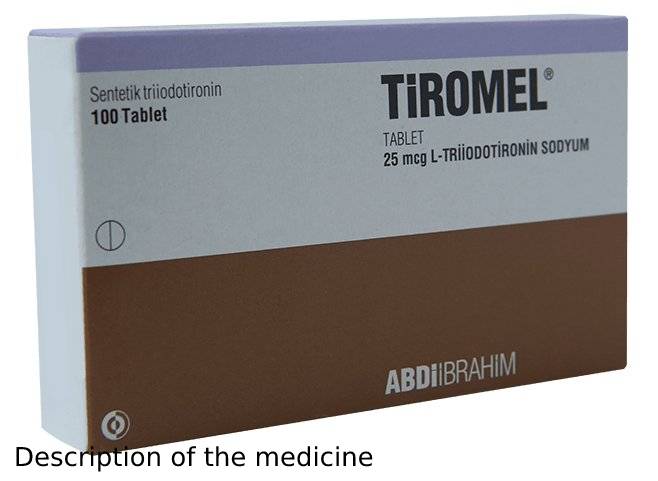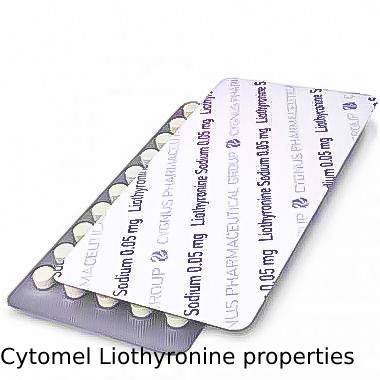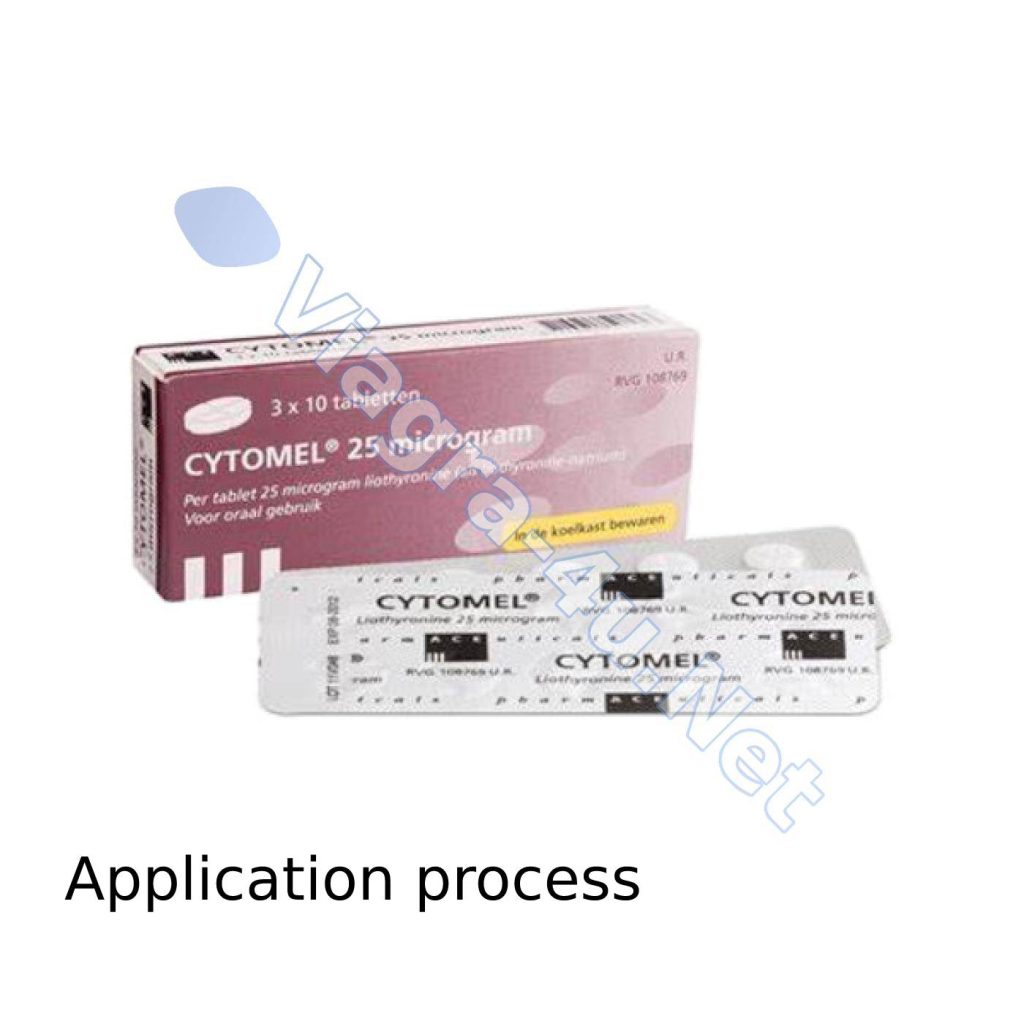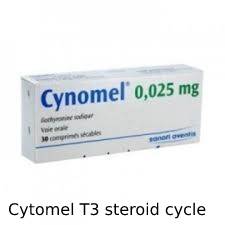Description of the medicine
Cytomel is the well-known trade name for the sodium salt of the synthetic thyroid hormone lothyronine. It is a perfect copy of the natural thyroid hormone triiodothyronine, the so-called T3 hormone. Synthetic cytomel has been available since the 1950s, but thyroid hormones such as T3 have been used in medicine since the 1890s. Early thyroid treatment regimens consisted of pure animal extracts and contained pure forms of T3 and T4 hormones. Extracted thyroid hormones have proven to be very useful in therapeutic regimens, particularly in the treatment of hypothyroidism. In this condition, the thyroid gland stops producing enough thyroid hormones, which can lead to weight gain, energy loss, hair loss and changes in the appearance and texture of the skin. Introducing Cytomel,
Cytomel is not the only synthetic thyroid hormone available. The T4 hormone, levothyroxine sodium, is also available under the trade name Synthroid. Both T3 and T4 are very similar, but T3 is considered to be 4-5 times more potent than T4. Simply put, T4 acts as a reserve for T3, making the Cytomel version the more potent of the two popular thyroid hormones. Although both are effective in treating hypothyroidism, Cytomel is the thyroid hormone of choice for performance-enhancing athletes. Users of anabolic steroids commonly use Cytomel to get rid of fat.
Functions and properties of Cytomel
Cytomel or T3 is a thyroid hormone that has a stimulating effect on basal metabolism. This hormone is involved in many cellular functions such as carbohydrate, fat and protein metabolism. If a person no longer produces enough of this hormone, as in hypothyroidism, the metabolism does not function properly. With hypothyroidism, a person will find that weight gain is common and weight loss is very difficult. He or she also often loses energy and in some cases even hair. The Cytomel supplement provides the body with the thyroid hormone it needs and the problem is solved.

A small dose of Cytomel is usually needed to treat hypothyroidism. This may not result in accelerated fat burning, but it will restore the metabolism to normal. However, many performance enhancing athletes choose to use Cytomel to improve direct fat loss. Taking Cytomel in combination with a calorie-restricted diet promotes significant and accelerated fat loss. Although effective, such use is generally not recommended in the absence of anabolic steroids. It is one of the most effective and efficient weight loss tools, but it cannot be called ideal. Many athletes report that Cytomel leaves them feeling lethargic, which is not surprising. Cytomel works with raw ATP. Because of the higher doses needed to burn fat and speed up ATP depletion, it can promote muscle loss. To meet its energy needs, the body takes energy from where it needs it. For this reason, anabolic blockers are usually recommended when supplementing with Cytomel.
Cytomel Liothyronine Sodium from BioTech Pharmaci Germany is used in sports for effective dehydration courses. With Cytomel you can speed up your metabolism significantly and get rid of excess fat in a short time.
Cytomel Liothyronine properties
The active ingredient of this powerful fat burner is liothyronine. It is a thyroid hormone of synthetic origin. Liothyronine is identical to the endogenous hormone and has the same positive and negative effects.
Like steroids, thyroid hormones were developed for active medical use. However, due to their drug-like properties, they quickly found their way into sports. Its main positive effects are as follows:
Metabolic processes are accelerated.
Metabolic processes are accelerated.
Active use of adipose tissue.
Stimulates the nervous system.
Increases efficiency.
Researchers have identified two important properties of liothyronine in many studies. First, it increases metabolism, which promotes faster utilization of adipose tissue. Second, it stimulates the nervous system, which improves motor skills and thinking.
Hypothyroidism of various origins (including pregnancy), thyroid hormone deficiency, recurrent hernia (prevention after resection), benign euthyroid hernia, adjuvant treatment of thyrotoxicosis with thyroid agents after euthyroidism (not pregnancy).

Thyroid cancer (suppressive therapy, replacement therapy after thyroid removal). As part of complex treatment, medical therapy is prescribed for the following conditions: Graves’ disease, autoimmune thyroiditis, thyroid function suppression test.
Application process
To be taken orally with a small amount of liquid. For hypothyroidism, the starting dose is 25-100 micrograms per day, the maintenance dose is 125-250 micrograms per day; for children, the starting dose is 12.5-50 micrograms per day, the maintenance dose is 100-150 micrograms per 1 square meter of body surface area. For congenital hypothyroidism in children up to 6 months of age, 8-10 mcg/kg/day; 6-12 months of age, 6-8 mcg/kg/day; 1-5 years of age, 5-6 mcg/kg/day; 6-12 years of age, 4-5 mcg/kg/day.
In endemic goiter, treatment starts at 50 mcg/day and gradually increases to an optimal level of 100-200 mcg/day.
Euthyroid hernia and prevention of recurrence after resection: 75-200 micrograms/day in adults, 12.5-150 micrograms/day in children. Adjunctive therapy with thyroid agents: 50-100 mcg/day. Thyroid malignancies (after surgery): 150-300 mcg/day.
For diagnostic tests: single dose of 3 mg in the morning on an empty stomach or after a light breakfast. It is taken 1 week before a planned radioactive iodine test of the thyroid gland. If necessary, a second dose can be given 2 weeks after administration. In patients with cardiovascular disease, the drug should be administered in a low initial dose, increasing slowly and at longer intervals, with regular ECG monitoring.

In elderly patients and in the case of prolonged hypothyroidism, treatment with the drug should be started gradually. In elderly patients, the starting dose is 25 μg, which is then increased to the full maintenance dose over 6-12 weeks.
